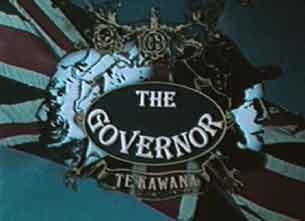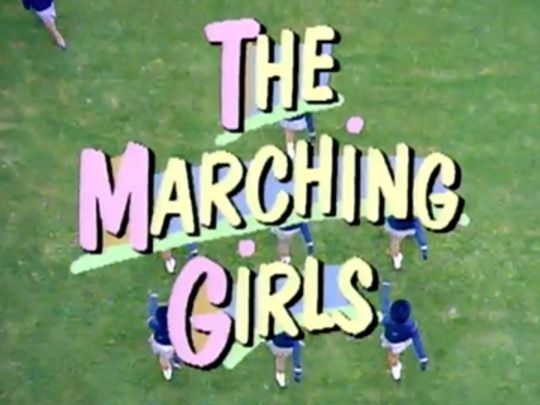 The Television One/NFU series The Governor was a "Six spectacular self contained films for television based on the life and times of Sir George Grey - one time Governor of Australia and South Africa, and the man who became the most powerful force in the making of 19th century New Zealand. At the age of 28, Captain George Grey was handed the Governorship of New Zealand - a beautiful but lawless land, inhabited by natives given to cannibalism. The few Europeans who had dared to settle were struggling to survive. The story of a man of ambition who was given power, which hadn't been known since the days of the Roman Empire." - National Film Library Catalogue
The Television One/NFU series The Governor was a "Six spectacular self contained films for television based on the life and times of Sir George Grey - one time Governor of Australia and South Africa, and the man who became the most powerful force in the making of 19th century New Zealand. At the age of 28, Captain George Grey was handed the Governorship of New Zealand - a beautiful but lawless land, inhabited by natives given to cannibalism. The few Europeans who had dared to settle were struggling to survive. The story of a man of ambition who was given power, which hadn't been known since the days of the Roman Empire." - National Film Library Catalogue
The series won the 1978 Feltex Award for Best Drama, with Episode 4: He Iwi Tahi Tatou (Now We Are One People) winning the 1978 Feltex Award for Best Script.
The show had its own TV Tie-in novelization, with a cover that makes it look like a Mills and Boon production.
Since March 2022 the full series has been available to watch via NZonscreen - excellent!
 1) The Reverend-Traitor (29/10/1978[R])
1) The Reverend-Traitor (29/10/1978[R])
The signing of the Treaty of Waitangi with many natives has not brought order to the new colony, and to prove it "some chief" keeps chopping the English flagpole down. Missionaries like Heny Williams are reluctant to accept the new settlements springing up, and turbulent warriors like Hone Heke and the old man Te Rauparaha are in open rebellion. .At the age of 28. George Grey is made the new Governor - he has been handed the power, and he intends to use it.
Credits
Sir George Grey: Corin Redgrave
Hone Heke: George Henare
Henry Williams: Grant Tilly
Te Rauparaha: Tamahina Tinirau
Lady Eliza Grey: Judy Cleine
Bishop Selwyn: Auton Lowe
Marianne Williams: Anne Flannery
Featuring: John Cronin, Robert Gould, Jim Haami, Roy Hope, Paraire Huata, Bill Johnson, Ivin Kiripatea, Kim Priest, Peter Sakey, David Skinner, te Whatanui Skipworth, Emie Stanley, John Tahu, Sef Townsend, Napi Waaka, Celia West, Lawrence McDonald, Waihoroi Shortland
Director/producer: Tony Isaac
Executive producers: Michael Scott-Smith, Tom Williamson
Series written by: Keith Aberdein
Based on stories by: Michael Anthony Noonan
Editor: Jamie Selkirk
Supervisor: Simon Reece
Assistant editor: Mike Bennett
Lighting cameraman: Kell Fowler
Camera operator: Bayley Watson
Process camera: Jack Mills B.S.C
Camera assistants: Mike Fuller, Forrest Smyth
Music: Ross Harris
Sound: Kit Rollings, Geoff Shepherd
Production designer: Warren Sellers
Art director: Ron Highfield
Assistant director: Leslo Hansen
Second assistant director: Heather Lundy
Unit manager: Tony Straw
Location manager: Kerry Loe
Props: Nick Hilligoss, Paul Finlay, Richard Walsh
Dressers: Paul Wilson, Olga hall, Bob Maysmor, Rex Pekin
Make-up supervisor: Di Lofthouse
Make-up artists: Patricia Cohen, Helen Dyson, Lesley Vanderwalt
Costume designer: Rohanna Hawthorne
Wardrobe mistress: Joan Grimmond
Wardrobe assistants: Andrea Burns, Christine Bait
Maori advisors: Moana Raureti, Tupi Puriri
Translations: Jim Pou, Koro Dewes
Military adviser: Brian Wilson
Moko artists: Napi Waaka, Eruera Nia
Liaison: Don Selwyn
Carving: Para Matchitt
Production manager: Rosalie Purchase
Transport: Roger Johnston
Electrics: Pav Govind, Duan Fakan, Colin Hainsworth
Grips: Bob Curtice, Harry Slowey
Stunts: Gerry Popov
Set decoration: Dean Cato, Robin Outterside
Special effects: Bob Duggan, Mitch Lovett, Johnny Morris
No Way to Treat a Lady (5/11/1978[R])
Eliza Lucy Spencer expects a great change in her life alter being rescued from the isolation of small town Australia by marriage to the young explorer and government agent, George Grey. Isolated colonial settlements seem no way of life to a lady with ambfllon, but Gray is determined to make his career in Australia or New Zealand. The clash of wills leads them towards tragedy, especially when Eliza discovers that husband ls not above leading the Victorian gentleman‘:s double life.
Henry Kappel (sp?) - Ken Blackburn
Edward Eyre - Jeremy Stephens
Ruthai (sp?) - Makuini Menehira
Sorson Pitt - Celia West
Sarah Selwyn - Margaret Burnette
Tamiki Waka Hone - Hapi Waaka
Janet - Christina Milligan
Written by Keith Aberdein
Producer - Tony Isaac
Director - Hugh MacDonald
3) The Mutinous Lieutenant (12/11/1978[R])
Gey is planning the introduction of self-government to the colony in his own way and his own time, but his plans are disrupted by the arrival of a Lieutenant Governor. The Colonial Office, much to Grey's disgust, has appointed Edward John Eyre - a somewhat awkward but ambitious man, who is well-known for his single-minded explorations across Australia.
Edward Eyre - Jeremy Stephens
Jack Ormond - Stephen Crane
Adelaide Ormond - Janice Finn
Eliza Ormand - Judy Cleine
Susan Pitt - Cleia West
Donald McLean - Alan Jervis
Judge Chapman - Michael Haigh
Written by Keith Aberdein
Producer - Tony Isaac
Director - Hugh MacDonald
4) He Iwi Ko Tahi Tatou (Now We Are One People) (19/11/1978[R])
Out of a growing sense of the loss of land there begins to emerge a Maori nationalism, controlled by a chief called Wiremu Tamehana.

Wiremu Tāmihana - Don Selwyn
Rewi Maniapoto - Kuki Kaa
Te Wherowhero - Bill Tawhai
Donald McLean - Alan Jervis
Tamati Waka Nene - Napi Waaka
Tioroori - Do Kahu
Ruthug - Makuini Merehira
Wikitoria - Keri Kaa
King - Paka Tawhai
Te Rauparaha - Tamahina Tinirau
Written by Keith Aberdein
Producer /director - Tony Isaac
1978 Feltex Award winner for Best Script.
5) The Lame Seagull (26/11/1978[R])
Thousands o British troops have come to fight the war against the Maori under the leadership of General Sir Duncan Cameron. A the General leads his men through the major battles of the war he becomes increasingly disturbed by what he sees. Not only are his own men dying, but his supposedly savage enemy is persiting against impossible odds with high courage and unquestionable chivalry
General Sir Duncan Cameron - Martyn Sanderson
Private Landers - John Callen
Private Tanner - Barry Emslie
Colonel Carey - Corporal Johnson - Norman Fletcher
Captain Gordon - Peter Hayden
Christine Balneavis - Louise Pajo
Hamiora - Rawiri Paratene
Wiremu Tāmihana - Don Selwyn
William Fox - Anthny Groser
Ensign William Muir - John Reid
Tieriari Te Haire - Do Kahu
Te Paerata - Hapi Potai
Robert Pariss - Keith Morley
Writen by Keith Aberdein
Produced by Tony Isaac
Directed by Peter Muxlow
6) To the Death (3/12/1978[R])
Isolated now on his island home of Kawau, Grey is growing old; the years and the laudanum have taken their toll. In the midst of his despair and loneliness there is a chance to return to a position of power. Perhaps it is too late to renew the battle for the ideals he once cherished

Annie Thorne George - Aileen O'Sullivan
Syemour Thorne George - Peter Bool
Nancy - Vivienne Riddle
John Sheehan - John Bach
Sir William Fox - Antony Croser
Jack Ormond - Stephen Crane
Donald McLean - Alan Jervis
George McLean - Bernard Kearns
William C. Wilson - William Scannell
Richard Seddon - Marshall Napier
Rewi Manipoto - Kuki Kaa
Wiremu Kingi - Paka Tawhai
Jimmy - Jamie Higgins
Liza - Judy Cleine
Written by Keith Aberdein
Produced by Tony Isaac
Directed by Peter Muxlow
The microfilm referred to when collating this information was not the clearest to read so my apologies for any misspelling of names.
The Reaction
In 1977 The Governor was the most ambitious drama series ever produced in New Zealand television history. Writing in 1985, when episode one was rebroadcast as part of TVNZ’s 25-year celebrations, Roger Moroney put it succinctly, “Undertaking the six-part series was, for television in this country, the equivalent of a boy going on from a couple of weeks at Outward Bound to have a crack at the north face of the Eiger. It was expensive, and critically received. What should have burst upon the international programme buying market as a blockbuster for New Zealand television production merely sat about in the shelves, waiting for 25 years of television to go by so it could have another airing.” — Daily Telegraph, 27 June 1985
Even before it was broadcast The Governor was controversial. The Prime Minister Robert Muldoon, attacked the programme and what he saw as the producers’ ‘spend, spend, spend’ attitude. Muldoon was so incensed that he ordered a Parliamentary public expenditure committee to investigate budgeting and the control of expenditure in television.
Commenting on The Governor in 2000, Lawrence McDonald wrote “The negative fallout from The Governor (alleged budgetary blowout of $1.4 million, ‘excessive’ nudity and violence, controversial Trotskyite lead actor, etc), which attracted the ire of Prime Minister Robert Muldoon, effectively spelt the end of such ambitious historical dramatised documentaries on New Zealand television. Apart from the series Pioneer Women in the early 1980s, there has been nothing quite like it since.” And it still holds true. — Diane Pivac
Screenings: The Governor screened on 7 September 2005 as part of 'Rarely Seen, But Important (& Pleasurable)', a season selected by ex-Film Commission marketing chief, Lindsay Shelton
Info from the now MIA page Film Archive NZ Feature Project: The Governor
A making of documentary is also available to watch at nzonscreen




Comments powered by CComment